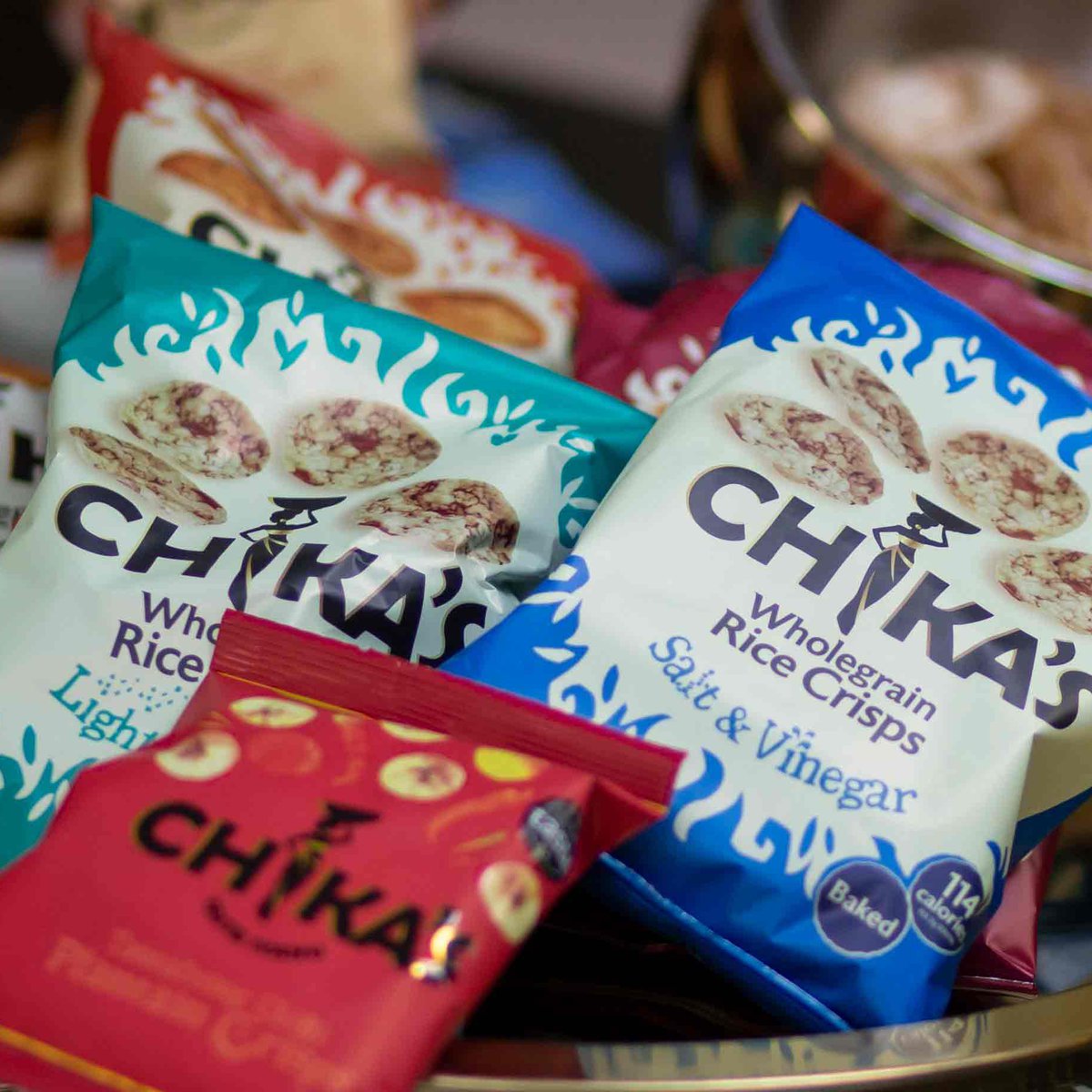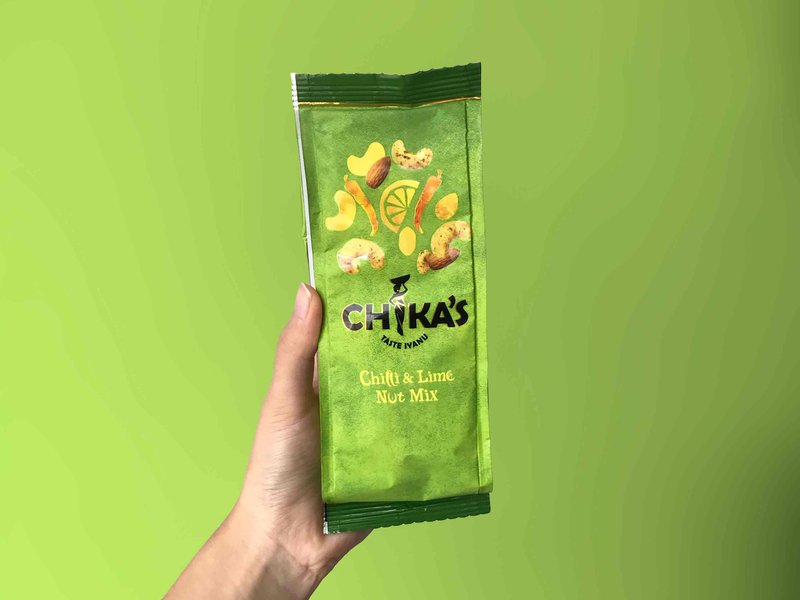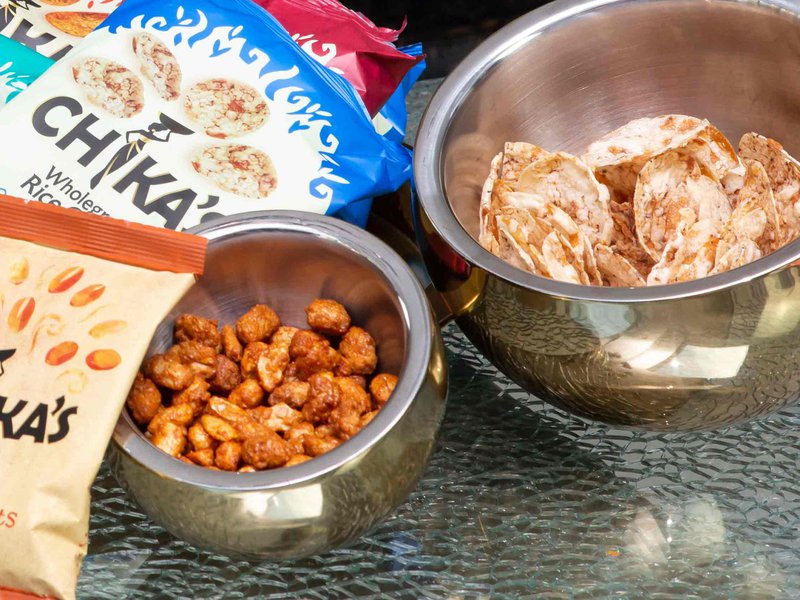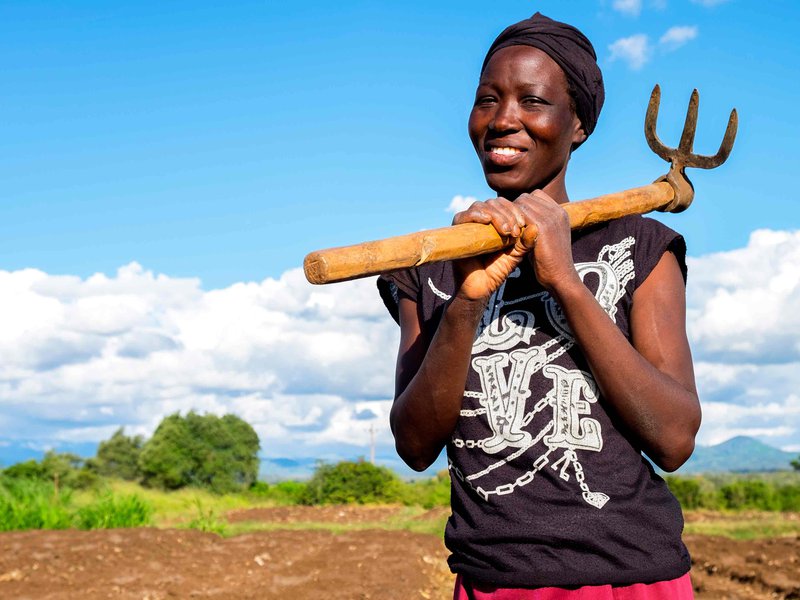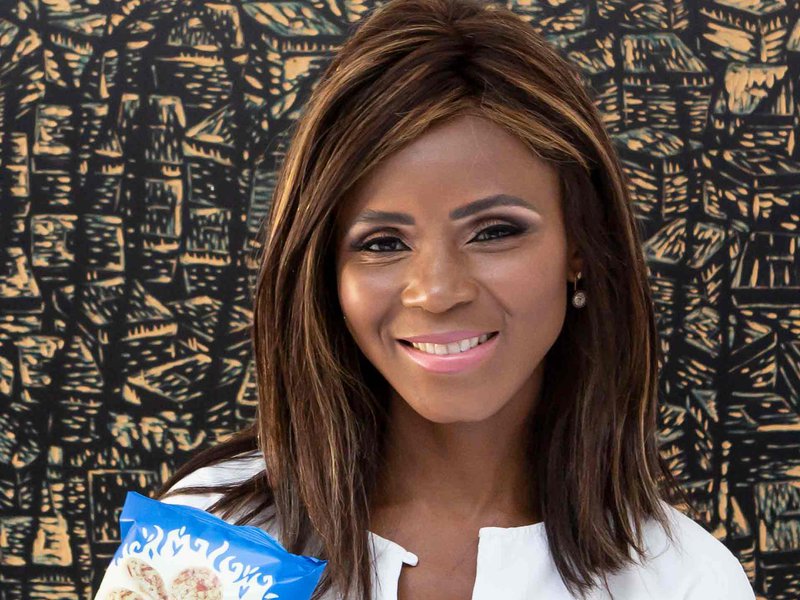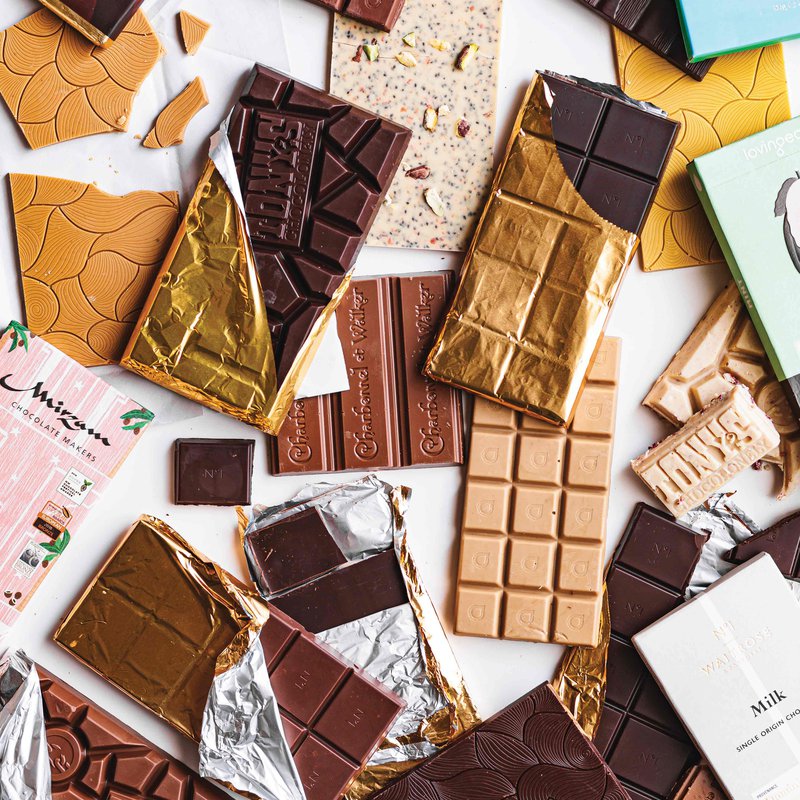Chika Russell is a name to know in the snacks industry. Inspired by foods she ate during her childhood in Nigeria, her products not only promote African culture and ingredients, but also make a huge impact on the lives of young girls, as well as those who help to produce them. The CHIKA’S range is now available at Spinneys and we’re proud to support such an inspirational woman, who firmly believes it’s up to all of us to make a difference when we can
You were born in the UK but spent your early childhood in Nigeria. What are some of your fondest memories?
When I think about my childhood, I have a sense of happiness, calm and joy. I lived in Nigeria until age six as it was important to my father that we understand our roots. Despite being so young, I remember it vividly.
I experienced a sort of freedom that many, including my children, have certainly never had. Every minute was spent outside picking fresh fruit and climbing a lot of trees. By the age of five I knew how to tell if a pineapple would be sweet, if a plantain was ready to eat and if a yam would be rotten inside.
I also formed strong friendships with girls my age from various socio-economic backgrounds – like that with my best friend Iffy, whose mum worked at the end of our street roasting yams, toasting nuts and frying bean cakes called akara for breakfast.
Food has evidently always played an important role in your life.
Yes, everything was and is around food for me. Mealtimes bring people together, especially in Nigeria. When someone comes over, you wouldn’t dream of offering them a cup of tea or a snack – it’s always a meal. And it’s at these gatherings that relationships are formed. My parents had an open-door policy at our home and we welcomed everyone in.
In fact, at my wedding, my father, the best man and my husband all mentioned my love of food and I think it exists because of my childhood and the joy it can bring.
Why did you leave Nigeria? And how did this make an impact on you?
My parents wanted us to be educated in the UK. At the time, I didn’t understand this. I wanted to stay in Africa where it was hot and people were always smiling. I also didn’t understand why my best friend couldn’t come, too. And this is when I realised the world is unfair. I was incredibly fortunate to be able to be given an opportunity while Iffy, being the eldest child, had to stay where she was and take over from her mum, grinding beans and not going to school. This definitely impacted me, and I think it is what drives my need to do right by other people. If you’re in a position to help others and balance the scales of justice – do it.
Did you return to Africa throughout your childhood?
Yes, we would travel there for summer break, Easter, half-terms and Christmas, as often as we could. I am one of seven siblings, but we were fortunate to be able to travel. I would still see Iffy, but as we got older, I realised just how different our lives were. It came down to luck and circumstance that I had the chance to have an education, but her world had to revolve around making street food snacks for a living.
Did you study food or business before starting CHIKA’S?
No, I studied economics. I ended up in investment banking and I was actually the only female, and black female at that, in my company for a while. I was the youngest staff member, too. I pushed myself hard in the industry, studying whenever I could. Because of my upbringing, and knowing how important it is to make the best of every chance you’re given, I’ve taken every opportunity I can to further my education.
What made you stop banking? And how was CHIKA’S born?
It was a confluence of many things happening at once. I met my husband, we wanted to start a family and it became apparent that I couldn’t be a mum who was present for her kids and remain in banking.
I love African art and I used to host shows at this time. I would make Nigerian street food snacks for these, like the akara that Iffy and I would have for breakfast, or toasted peanuts and baked plantains. Everybody loved them and I realised that these foods that I grew up with needed to be showcased.
At the same time, I was sponsoring a couple of girls’ education, but I saw the need to do this on a larger scale and my salary didn’t allow for that. So, I just decided I was going to start a business that promotes African culture and food that would be based on supporting and empowering young women.
So, there was no second-guessing?
I pondered over it for a little while but thought hey, everyone likes a snack so why not do it? I also like a good challenge! I wanted to see my products on supermarket shelves, so I began.
Was it a conscious decision to make it an eponymous brand?
Not at all. Parents of a friend of mine had a successful business selling to retailers and I had presented them with my first ‘designs’. I had no marketing support at the time. I also had no idea what to call the brand and had just put my name there as placeholder text. The couple were besides themselves with excitement and because they were successful and enthusiastic, this convinced me to stick with CHIKA’S.
What does your brand identity represent?
The illustration of the young woman or chikita in our logo sits in the middle of each bag. Her hand is on her hip. She’s strong and powerful, but also kind. She shares with others. She is proud of what she has achieved and has confidence – which is so important. I think she represents all women.
You appeared on the BBC’s Dragons’ Den in 2015 – but turned down an investment offer. Why did you enter and what happened?
When I launched CHIKA’S I made a lot of mistakes, from design and packaging to product positioning. I wanted a premium brand – because I wanted to raise the bar for African snacks, but I also wanted mass visibility. At first, products were sold only in five-star hotels which didn’t reach a wide enough audience. And my branding wasn’t right – it was sterile. It also became evident I needed funding to be listed in the premium retailers which is why I entered Dragons’ Den. In addition, I thought I needed a partner who was well-known and had a good business network. I am a glass-half-full type of person so it didn’t occur to me that I may be ridiculed, insulted or laughed off the show. And this is not coming from a place of arrogance – I just didn’t think about it. I was on stage for three hours and twenty minutes (in six-inch stilettos!) – instead of the expected 15 minutes. It was a lot of fun; the dragons were great and I chose a partner. However, it soon became apparent that we weren’t motivated by the same things. I trusted my gut feeling and pulled out.
Did you succeed in obtaining investment?
Yes. I raised capital from various investors – many of whom I knew from the banking industry. A number of these people were already consumers of my snacks, too – which helped.
Who else has advised, mentored or helped you along the way?
I met Sahar Hashemi, the co-founder of Coffee Republic and confectionery brand Skinny Candy. She is the one who told me my snacks were great, but my branding was rubbish! When we met she said: “I don’t know who you are because your brand is cold; there’s no energy behind it and I wouldn’t buy your snacks.” I thought, why don’t you tell me how you really feel? But she decided she wanted to mentor me and work with CHIKA’S as she liked my story and the idea of the products. Sahar advised me to get an agency, rebrand and add colour to my packaging. So it’s thanks to her that we have bright colours like yellow, green and purple and that our products represent Africa and an enthusiasm for life.
Our managing director Emma Grant also helped me a great deal, before even joining the business. For about three years we’d have long calls when she’d advise me on anything and everything. Coincidentally, she also grew up in Nigeria.
It’s time to tell us about the nine CHIKA’S products available now in Spinneys stores – what are they?
Look out for our peanuts (with and without skin); sea salt and vinegar rice crisps; smoky BBQ rice crisps and sweet chilli samba wholegrain rice crisps; sea salt and black pepper cashews and the chilli and lime nut mix. All our products are vegan-friendly, gluten-free and made from 100 per cent natural ingredients with no artificial colours or flavourings.
Tell us about CHIKA’S peanuts – what sets them apart?
We source epa nuts from communities in Nigeria and the natural process used to produce our hand-toasted peanuts is built on traditional methods that have been passed down through generations. The nuts are harvested fresh, shelled and then a lightly salted water solution is sprinkled over them. They’re left to dry in the African sun, which intensifies the salt flavour, before they’re toasted over open woodfires in large cast-iron pans. This is done manually by a team of women and it is a labour-intensive practice. Our peanuts arrive at the market in as little as four weeks with nothing added and ultimately they contain only 1 per cent salt.
Sourcing from Nigeria has its challenges, but we wouldn’t do it any other way – even if we could. We’ve been able to create jobs for women and that is important to us.
Chika’s ‘skinny’ rice crisps are wholesome, low in fat and calories and they taste good – how do you achieve this?
We use a combination of brown rice and lentils for our crisps. These ingredients are used whole, which means they retain all their goodness and they are simply pressed between two flat plates under high pressure to make crisps, so there’s no frying involved.
You work with World Vision – tell us about the Snacks4Change partnership and why this is a focus for CHIKA’S.
Snacks4Change is an initiative that supports girls through education. Because women empowerment is what CHIKA’S is all about, we believe in the power the initiative can have in helping to change not only the lives of the girls whom we help, but also those of their families and future generations. We donate a penny a bag to World Vision, changing lives one pack at a time and hope to be able to give 30,000 girls access to education by 2025. We are also involved with building schools for children across Africa in the next decade.
What future plans do you have for the business?
We’re planning to launch CHIKA’S AFRICA, which will involve having teams who work with, and source directly from, a number of producers and farms across the continent. It will be great to be able to promise small-scale suppliers work so that they don’t need to worry about selling their products in local street markets.
Are you still in touch with Iffy?
Definitely! And when the business changes, I hope I can convince her to change her career path and join us.
For more information, visit chikas.co.uk and @chikasfoods
